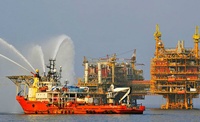Govt trying to keep revised gas price below $6.8 per mmBtu
24 Jun 2014
The Narendra Modi-government is expected to increase the price of domestically-produced natural gas from $4.2 per million British thermal units to $5.5-6.8 per mmBtu, against the $8.4 per unit proposed by the UPA government.
 While a decision on the final price is yet to be made, indications emerging from hectic discussions between the oil ministry and the prime minister's office suggest that the increase will be $2 lower than the $8.4 per mmBtu price recommended by the UPA government.
While a decision on the final price is yet to be made, indications emerging from hectic discussions between the oil ministry and the prime minister's office suggest that the increase will be $2 lower than the $8.4 per mmBtu price recommended by the UPA government.
The aim is to simplify the pricing formula so as to avoid doubling of present gas price from $4.2 per mmBtu to $8.4 per unit. It is likely that the new pricing formula would benchmark consumer-friendly gas prices.
The price of domestically-produced gas will be pegged to producer price in Russia, which is expected to replace import price in Japan, which imports gas at very high prices.
The new formula is also expected to specify pricing method based on net calorific value (NCV), which works out 10 per cent cheaper than gross calorific value (GCV). NCV is calculated on reduced volumes after deducting impurities such as water or other gaseous content present in natural gas.
A decision on the gas price hike is expected before 1 July as the oil ministry had committed to RIL, the main stakeholder, to abide by the terms of the production sharing contract (PSC), which provides for market-based pricing, oil ministry officials said.
Moreover, since RIL has initiated arbitration proceedings against the central government over the its alleged failure to abide by the terms of the production-sharing contract, the 1 July deadline assumes importance.
State-run ONGC will the bigger beneficiary of any price revision and the government could then ask it to part with some of the money to share increased fuel subsidy.
Commentators say, the government could also deregulate diesel price while simultaneously reducing central levy on the fuel in the budget to soften the blow on consumers.
Prime minister Narendra Modi is reported to have held two rounds of talks with oil minister Dharmendra Pradhan and petroleum secretary Saurabh Chandra on Friday. The PM also had a round of discussion on Monday that was also attended by finance minister Arun Jaitley.
Any hike in producer price of natural gas will push up consumer prices, impacting cost of living, particularly in cities where CNG is used for public transport and PNG is increasingly becoming the choice for cooking.
Higher gas price will also impact the price of power by pushing up generation costs for gas-fired plants, which account for roughly 8 per cent of the installed capacity in the country.